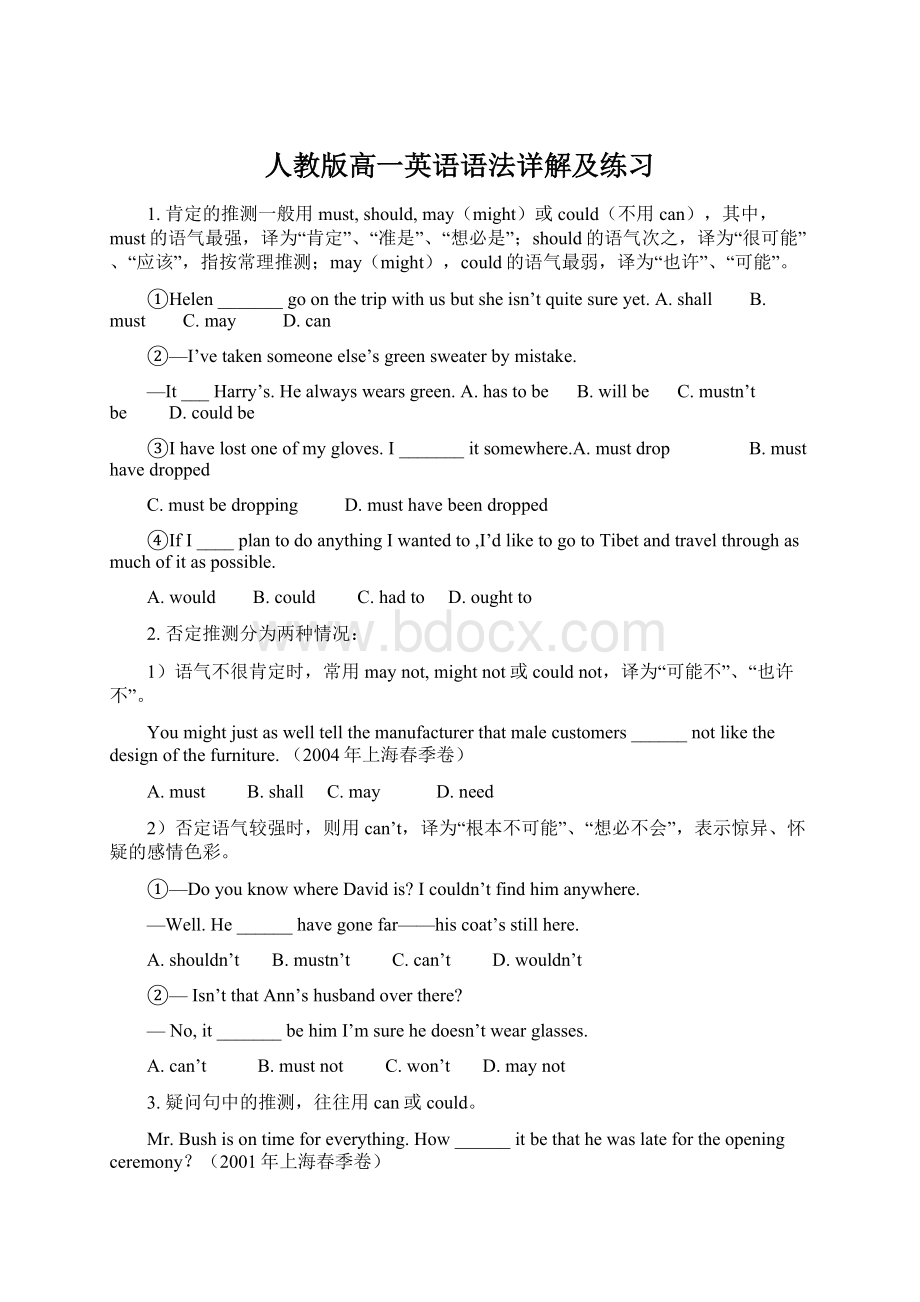人教版高一英语语法详解及练习.docx
《人教版高一英语语法详解及练习.docx》由会员分享,可在线阅读,更多相关《人教版高一英语语法详解及练习.docx(14页珍藏版)》请在冰豆网上搜索。

人教版高一英语语法详解及练习
1.肯定的推测一般用must,should,may(might)或could(不用can),其中,must的语气最强,译为“肯定”、“准是”、“想必是”;should的语气次之,译为“很可能”、“应该”,指按常理推测;may(might),could的语气最弱,译为“也许”、“可能”。
①Helen_______goonthetripwithusbutsheisn’tquitesureyet.A.shall B.must C.may D.can
②—I’vetakensomeoneelse’sgreensweaterbymistake.
—It___Harry’s.Healwayswearsgreen.A.hastobe B.willbe C.mustn’tbe D.couldbe
③Ihavelostoneofmygloves.I_______itsomewhere.A.mustdrop B.musthavedropped
C.mustbedropping D.musthavebeendropped
④IfI____plantodoanythingIwantedto,I’dliketogotoTibetandtravelthroughasmuchofitaspossible.
A.would B.could C.hadto D.oughtto
2.否定推测分为两种情况:
1)语气不很肯定时,常用maynot,mightnot或couldnot,译为“可能不”、“也许不”。
Youmightjustaswelltellthemanufacturerthatmalecustomers______notlikethedesignofthefurniture.(2004年上海春季卷)
A.must B.shall C.may D.need
2)否定语气较强时,则用can’t,译为“根本不可能”、“想必不会”,表示惊异、怀疑的感情色彩。
①—DoyouknowwhereDavidis?
Icouldn’tfindhimanywhere.
—Well.He______havegonefar——hiscoat’sstillhere.
A.shouldn’t B.mustn’t C.can’t D.wouldn’t
②—Isn’tthatAnn’shusbandoverthere?
—No,it_______behimI’msurehedoesn’twearglasses.
A.can’t B.mustnot C.won’t D.maynot
3.疑问句中的推测,往往用can或could。
Mr.Bushisontimeforeverything.How______itbethathewaslatefortheopeningceremony?
(2001年上海春季卷)
A.can B.should C.may D.must
4.对已发生事情的肯定推测常用“must,may,might等+完成式”;否定推测常用“can,could,may,might等+完成式”。
①Iwasonthehighwaywhenthiscarwentpastfollowedbyapolicecar.They_______atleast150kilometersanhour.
A.shouldhavebeendoing B.musthavebeendoing
C.couldhavedone D.wouldhavedone
②He_______havecompletedhiswork;otherwise,hewouldn’tbeenjoyinghimselfbyseaside.(2005年北京卷)
A.should B.must C.wouldn’t D.can’t
③—Tomisneverlateforwork.Whyisbeabsenttoday?
—Something________tohim.A.musthappen B.shouldhavehappened
C.couldhavehappened D.musthavehappened
④MysistermethimattheGrandTheatreyesterdayafternoon,sohe_____haveattendedyourlecture.(2000年上海卷)
A.couldn’t B.needn’t C.mustn’t D.shouldn’t
二、“情态动词+完成式”
1.“should(oughtto)+完成式”表示本应该做某事而实际上没有做。
其否定式表示某种行为不该发生但却发生了。
①—I’lltellMaryabouthernewjobtomorrow.
—You________herlastweek.
A.oughttotell B.wouldhavetold
C.musttell D.shouldhavetold
②Oh,I’mnotfeelingwellinthestomach,I_____somuchfriedchickenjustnow.
A.shouldn’teat B.mustn’thaveeaten
C.shouldn’thaveeaten D.mustn’teat
2.“could+完成式”表示本来能够做成某事的但结果没能做成,含有遗憾的意味。
Hepaidforaseat,whenhe______haveenteredfree.
A.could B.would C.must D.need
3.“needn’t+不定式的完成式”表示本来不必做某事而实际上做了某事。
例如:
Youneedn’thavewateredtheflowers,foritisgoingtorain.你本不需要浇花的,因为天就要下雨了。
—Catherine,Ihavecleanedtheroomforyou.
—Thanks.You______it.Icouldmanageitmyself.A.needn’tdo B.needn’thavedone C.mustn’tdo D.shouldn’thavedone
三、常见的情态动词
1.shall用于一、三人称疑问句表示征求对方意见;用于二、三人称陈述句表示说话人给对方的命令、警告、允诺或威胁等。
①“Theinterest bedividedintofiveparts,accordingtotheagreementmadebybothsides,”declaredthejudge.A.may B.should C.must D.shall
②—Excuseme,butIwanttouseyourcomputertotypeareport.
—You______havemycomputerifyoudon’ttakecareofit.
A.shan’t B.mightnot C.needn’t D.shouldn’t
③—Theroomissodirty.______wecleanit?
—Ofcourse.
A.Will B.Shall C.Would D.Do
2.must用于疑问句,表示责备、抱怨的感情色彩,意思为“偏偏,偏要”;mustn’t表示禁止,是说话人强有力的劝告。
①John,lookatthetime._______youplaythepianoatsuchalatehour?
A.Must B.Can C.May D.Need
②Tom,you leaveallyourclothesonthefloorlikethis!
A.wouldn’t B.mustn’t C.needn’t D.maynot
3.needn’t表示“没有必要”。
—Lucydoesn’tmindlendingyouherdictionary.
—She______.I’vealreadyborrowedone.
A.can’t B.mustn’t C.needn’t D.shouldn’t
4.would表示过去反复发生的动作或某种倾向。
Whenhewasthere,he___gotothatcoffeeshopatthecornerafterworkeveryday.
A.would B.should C.hadbetter D.might
5.表示经过努力而成功的某一次动作,只能用was/wereableto,而不能用could。
Thefirespreadthroughthehotelveryquicklybuteveryone_____getout.
A.hadto B.would C.wasableto D.could
6.考查情态动词用作答语的情况
①—Writetomewhenyougethome.—_______.A.Imust B.Ishould C.Iwill D.Ican
②—CouldIcallyoubyyourfirstname?
—Yes,you______.A.will B.could C.may D.might
巩固练习:
1.Michael______beapoliceman,forheismuchtooshort.
A.needn’t B.can’t C.should D.may
2.ItoldSallyhowtogethere,butperhapsI____forher.
A.hadtowriteitout B.musthavewrittenitout
C.shouldhavewrittenitout D.oughttowriteitout
3.Jack_____yet,otherwisehewouldhavetelephonedme.
A.mustn’thavearrived B.shouldn’thavearrived
C.can’thavearrived D.needn’thavearrived
4.Sir,you______besittinginthiswaitingroom.Itisforwomenandchildrenonly.
A.mustn’t B.can’t C.won’t D.needn’t
5.Aleft-luggageofficeisaplacewherebags_______beleftforashorttime,especiallyatarailwaystation.
A.should B.can C.must D.will
6.—IsJohncomingbytrain?
—Heshould,buthe_____not.Helikesdrivinghiscar.A.must B.can C.need D.may
7.Ithasbeenannouncedthatcandidates_______remainintheirseatsuntilallthepapershavebeencollected.A.can B.will C.may D.shall
8.Youcan’timaginethatawell-behavedgentleman______besorudetoalady.
A.might B.need C.should D.would
9.—Don’tforgettocometomybirthdaypartytomorrow. —_______.
A.Idon’t B.Iwon’t C.Ican’t D.Ihaven’t
10.Ididn’tseeherinthemeeting-roomthismorning.She____atthemeeting.
A.mustn’thavespoken B.shouldn’thavespoken
C.needn’t havespoken D.couldn’thavespoken
例题答案Key:
CDBB Key:
CKey:
CA Key:
A Key:
BBDA Key:
DC
Key:
A Key:
B Key:
DAB Key:
AB Key:
C Key:
AKey:
C Key:
CC
练习答案与解析
1.B 从第二个分句“他太矮了”可以推知说话者持否定态度,needn’t意思是“没有必要”,与语境不符。
2.C 根据句意“我已经告诉她怎样到那儿,但是或许我应该给她写下来”可知,说话者含有“后悔、遗憾”的意味,应使用“情态动词+完成式”形式,“must+完成式”表示对过去的肯定推测,“should+完成式”才表示虚拟意义。
3.C 根据第二分句“否则的话他就会给我打电话了”可知“Jack肯定还没到”,“can’t+完成式”意思是“根本不可能”。
4.A 从第二分句可知,这是妇女和儿童专用候车室,因此你“不准”坐在这儿。
mustn’t表示“禁止,不准”。
5.B can在此表示许可。
6.D 从后一句“他喜欢开车”可知说话者把握不大。
mustnot不表示推测,cannot的语气太绝对,意思是“根本不可能”。
7.D shall用于第二、三人称,表示说话人给对方的命令、警告、允诺、威胁等意思。
8.Cshould在此表示惊讶的感情色彩,意思是“竟然”。
9.B对祈使句的肯定回答用Iwill;否定回答用Iwon’t。
10.D根据句意“我今天上午在会议室没见到她”,所以“她根本不可能在会上发言”。
表示“根本不可能”用can’t/couldn’thavedone形式。
定语从句
(一)结构:
在复合句中,修饰某个名词或代词的句子(做这个名词或代词的定语)叫定语从句,定语从句一般放在被修饰的名词或代词后面,被修饰的名词或代词叫做定语从句的先行词,它与定语从句之间要有一个词连接,这个词指代先行词的内容叫做关系词(关系代词或关系副词:
that,which,who,whose,when,where,why)。
先行词在定语从句中充当主语,宾语,时间,地点,原因状语。
结构:
先行词+关系词+定语从句。
1.Thereshesawawallofwaterthatwasquicklyadvancingtowardsher.
2.InJapan,someonewhoseesanotherpersonmakingthegesturewillthinkitmeansmoney.
3.Athemeparkisacollectionofrides,exhibitionsorotherattractionsthatarebasedonacommontheme.
4.TheparkhasaconservationcenterthathelpsprotectmarineanimalsandtheirhabitatsintheriversandcoastalwatersofAsia.
5.Visitorscangoonexcitingrideswheretheycanfeelwhatitisliketodothethingstheyhaveseentheirheroesdointhemovie.
6.OprahWinfreyisablackwomanwhoserisetofameisaninspiringstory.
(二)定语从句分为限定性定语从句和非限定性定语从句:
限定性定语从句:
从句对先行词进行必要的描述或说明,缺少它,则句义显得不完整,从句与先行词紧密相连。
非限定性定语从句:
对先行词进行补充说明,解释,它与先行词之间有逗号隔开。
1.Beforeshecouldmove,sheheardaloudnoise,whichgrewtoaterribleroar.
2.Treeaftertreewentdown,cutdownbythewater,whichmusthavebeenthreemetersdeep.
3.Flora,whosebeautifulhairanddresswereallcoldandwet,startedcrying.
4.Theirtalkincludesrhythmandrhymingwordsaswellastonguetwisters,whichoftenmaketheaudienceapplaud.
(三)关系词前面可以根据定语从句的内容加上一些介词,这些关系词在介词后面常用which或whom.
1.TherewasamanwithwhomIwouldhavetoworktogetherandfinallythemanagerofthecompany.
2.Manypeoplewhosawthefilmwereafraidtoswimintheseawhentheyrememberedthescenesinwhichpeoplewereeatenbytheshark.
知识重点与难点
(一)当先行词有最高级,序数词修饰,是不定代词,或是all,no,only等形式时,关系代词一般用that,而不能用which。
1.TheTitanicwasthelargestshipthathadeverbeenbuiltatthattime.
2.Thereisonethingthatkeepsworryingme.
(二)当先行词是表示时间,地点,原因的词时,关系词用when,where,why还有which,that
1.I’mverygladtoreturntomyhometownwhereIhadlivedfor10years.
2.ThisismyhometownwhichIusedtotalkabouttoyou.
3.IthinkIcanunderstandthereasonwhyhedidn’ttellthetruthtome.
4.Noonebelievesthereasonthathegaveusabouthisabsenceatthemeeting.
(三)定语从句的简化表达:
1.ThemanwhoissittingontheplatformisaprofessorfromWuhanUniversity.
2.Theletterthatwasmailedlastnightwillreachhimtomorrow.
3.Thequestionthatisbeingdiscussedisveryimportant.
4.Youarewelcometoapartytobegiveninourclassat7:
45.
说明:
以上的定语从句部分可以用更加简单的非谓语形式表达出来:
1.Themansittingon